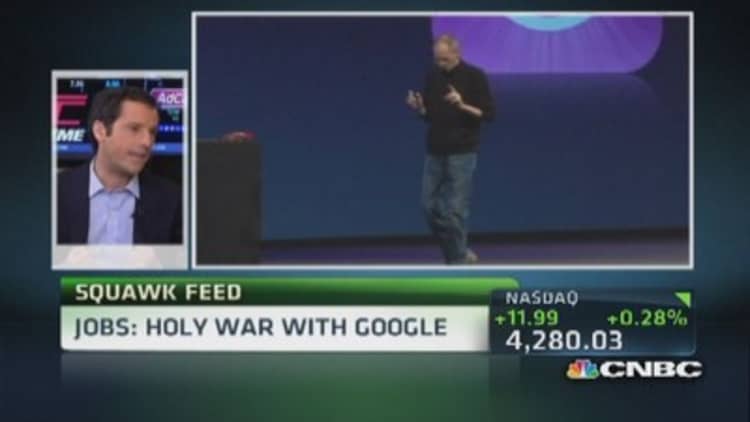
Steve Jobs warned Apple's leadership a year before his death that the company he founded faced an "innovator's dilemma" over the growing threat from Google and promised a "holy war" on smartphones running its Android software, according to evidence shown in court on Tuesday
Samsung, which is defending itself against Apple's demand for $2bn in damages for what the iPhone maker alleges is "massive" patent infringement, showed emails written by Mr Jobs in October 2010 to the jury in a new Californian case that began this week.
As part of its opening arguments, Samsung accused Apple of launching an "attack on Android", the Google smartphone software used by its accused devices.
Preparing for Apple's annual retreat of its "top 100" executive team, Mr Jobs said that a "holy war with Google" in 2011 was the "primary reason" for the meeting, according to emails shown by Samsung.
Mr Jobs sent the email less than a year before resigning as Apple's chief executive in August 2011, when he was succeeded by Tim Cook; he died two months later.
He said that Apple needed to "catch up to Android" in areas where the iPhone lagged behind, such as notifications, wireless tethering to other devices and speech recognition, ahead of the launch of its own Siri voice-activated assistant in 2011.

Mr Jobs added that Google was "way ahead of Apple" in the way it integrated its cloud services, such as contacts, calendars and emails.
This created an "innovator's dilemma" for his company, Mr Jobs said, in a reference to the 1997 Clayton Christensen book that describes how a market leader can become vulnerable to new challengers by clinging to successful products and strategies for too long.
John Quinn of Quinn Emanuel, Samsung's attorney, also showed an email from Phil Schiller, Apple's head of marketing, indicating concerns last year at the success of Samsung's branding campaign.
After displaying an Apple study that found Samsung's brand impression was "just as strong as Apple's in the US", Mr Quinn said that Mr Schiller became "obsessed" with the rival's ad campaign, with the tagline "the next big thing is already here", and was "frustrated that Apple seemed unwilling" to counter it.
Mr Schiller wrote to Mr Cook suggesting that Apple should change its longstanding advertising agency, TBWA\Chiat\Day. He also wrote a separate email in January 2013 to the agency, referencing an article that Apple was losing its "cool" to Samsung: "We have a lot of work to do to turn this around."
Read MoreApple's war on Samsung has Google in crossfire
Mr Quinn argued that this was evidence that Samsung's brand and device features were helping it to compete with the iPhone in the US market, rather than merely relying on stolen technology, as Apple alleges.
In its opening arguments, Apple copied its own legal tactics from the patent case that saw it win almost $1bn in damages in 2012.
Apple claims that Samsung has sold 37m smartphones and tablets that copy its designs and that it is due more than $2bn in damages. In turn, Samsung accuses several iPhone and iPad models of infringing two of its patents.
Just as in the 2012 case, counsel for Apple began by accusing its Korean rival of "massive" intellectual property infringement, and positioning its flagship smartphone as a device that reshaped an industry with a range of innovations.

An eight-person jury in the San Jose, California courtroom was also shown internal Samsung emails that suggested the company experienced a "crisis of design" in its competition with the iPhone. The documents were also previously shown in the 2012 trial.
Harold McElhinny of Morrison Foerster, Apple's attorney, began by taking the jury back to the launch of the first iPhone, asking: "Where were you on January 9th 2007?"
Playing video clips of Mr Jobs unveiling the iPhone on stage in San Francisco, Mr McElhinny argued for the "dramatic changes", such as its touch screen user interface, which the device introduced.
The iPhone was the result of a three-year research and development effort, he added, a process detailed at the earlier trial.
Samsung, which is appealing its 2012 defeat, has argued that it was just keeping tabs on the competition and denies that it infringes Apple's patents.
Read More Has Google unseated Apple as king of innovation?
"This is not competitive intelligence, this is cut and paste copying of a patented invention," Mr McElhinny argued.
Devices running Google's Android and made by Samsung, HTC, Lenovo and others now make up more than three quarters of the world's smartphone sales, as Apple's share has declined in recent years in the face of the competition.
Samsung said that Apple was trying to restrict competition through its legal action and regain in the courtroom "what it has lost in the marketplace".
Waving Samsung's Galaxy Nexus device at the jury, Mr Quinn said: "Not one of the accused features on this phone . . . was designed, much less copied, by anyone at Samsung.
"The accused features on this phone were developed independently by some of the most sophisticated and creative minds in the software industry: the software engineers at Google, up the road in Mountain View."

